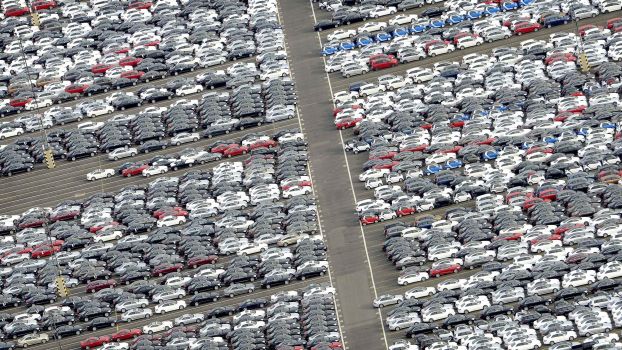
File photo of cars for export standing in a parking area at a shipping terminal in the harbor of the northern German town of Bremerhaven on October 8, 2012.(REUTERS/Fabian Bimmer/Files)
The EU said Germany’s current-account surplus has exceeded the bloc’s 6 percent threshold every year since 2007 and may put upward pressure on the euro. The European Commission, the EU executive in Brussels, said Germany’s high savings rate has outpaced investment and it urged the country to boost domestic consumer spending.
German surpluses “may put pressure on the euro to appreciate vis-à-vis other currencies,” the commission said Wednesday in a report on economic imbalances across the bloc. “In case such pressures materialize, this would make it more difficult for the peripheral countries to recover competitiveness through internal depreciation.”
Germany, Europe’s largest economy, is among a group of 16 countries facing in-depth probes into their economic imbalances, the EU said. France, Spain and Italy, which are battling to reduce budget deficits, will face a second year of investigations after the commission warned them last April to adjust economic policy. Luxembourg and Croatia will face reviews for the first time.
The commission called on Germany and other countries with trade surpluses, like the Netherlands, to boost investment and possibly reduce savings rates. Countries like France and Italy should take action to regain export market share.
The opening of an in-depth review into the imbalances in Germany’s economy, a process that could eventually lead to sanctions of the kind that other euro countries face for budget deficits, comes after the US Treasury blamed German surpluses for draining European and global growth. The International Monetary Fund also has reprimanded Germany for its surpluses, urging Chancellor Angela Merkel to curtail the trade surplus to an “appropriate rate” to help euro partners cut deficits.
The review follows a European Commission forecast published last week that Germany’s current-account surplus will hold at 7 percent of output this year, then narrow to 6.6 percent in 2014. Those projections were up from a May estimate of 6.3 percent and 6.1 percent, respectively.
The EU can open a review if a country’s current account exceeds 6 percent of GDP over three consecutive years. The commission said Germany has exceeded that level since 2007. The review will take other indicators into account before deciding whether the economy is showing excessive imbalances.
The commission said that, after it had identified imbalances in France in April, it was now necessary to consider the risks of them persisting. France continues to experience “losses in export market shares, private debt and general government-sector debt,” the commission said.
Neighboring Spain and Italy will also be under enhanced scrutiny as they struggle out of the economic slump.
In Spain, “government debt is rapidly increasing on account of public deficits, bank recapitalization and settlement of arrears to suppliers,” the commission said. In Italy, “export performance compares unfavorably to that of other advanced economies.”
The European Central Bank last week cut its key interest rate to a record-low 0.25 percent in a move that some investors say was intended in part to curb the euro after it soared to the strongest since 2011 against the US dollar. ECB President Mario Draghi said the euro’s strength “didn’t play any role” in the central bank’s decision.
The euro traded at 1.3415 against the US dollar at 2:06 pm in Brussels, down from a recent peak above USD 1.38 in late October. The European currency is 5.6 percent higher against the dollar from a year ago.
